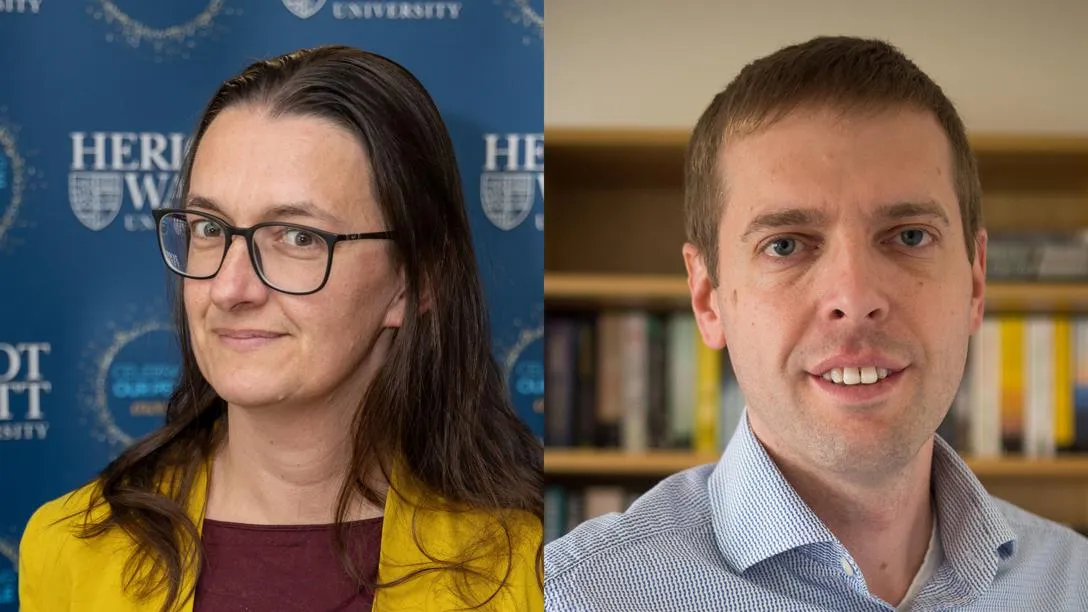Heriot-Watt teaching staff shortlisted in 2024 Times Higher Education Awards

Two members of our teaching staff at Heriot-Watt University have been shortlisted in the prestigious 2024 Times Higher Education Awards.
Shortlisted as Most Innovative Teacher of the Year is Alex MacLaren, Associate Professor in Architecture at the University’s School of Energy, Geoscience, Infrastructure and Society.
Shortlisted as Outstanding Research Supervisor of the Year is Dr Colin Rickman, Associate Professor in our School of Engineering & Physical Sciences.
They are among around 120 finalists from more than 70 institutions who have been shortlisted for the 20th-anniversary edition of the Times Higher Education (THE) Awards.
Dubbed “the Oscars of higher education”, the awards received a record-breaking number of entries in 2024, surpassing 700 and beating last year’s record by almost 100.

Professor Richard A. Williams, Principal and Vice-Chancellor of Heriot-Watt University said: “I am delighted to congratulate Alex MacLaren and Dr Colin Rickman on being shortlisted for these prestigious awards.
“Their dedication to teaching and research excellence exemplifies the values of Heriot-Watt University. Alex MacLaren’s innovative approach to real-world learning and Dr Rickman’s commitment to guiding the next generation of researchers have made a profound impact on our students and the wider academic community.”
Harnessing her industry experience as a Chartered Architect, Associate Professor MacLaren brings students extraordinary real-world experiences, with a focus on building global communities to tackle the climate emergency.
Her work included inspiring students to design and build an innovative net-zero solar house in Scotland, exhibit it at World Expo in Dubai, and champion ongoing collaboration between the students and 40 industry partners.
“I want to inspire students to engage with the net zero challenge and help them to develop their advocacy skills; individually and as a team,” Associate Professor MacLaren explained. “More than 400 students across 13 programmes at Heriot-Watt worked on our solar house project, so it expanded to include computer scientists, mechanical engineers, textiles designers, business students and many others. This created a real global community of learning across our campuses in the UK, Dubai and Malaysia and empowered our students to lead a complex project with direct real-world impact. I am absolutely thrilled to be shortlisted in such a prestigious awards programme.”
Associate Professor MacLaren has most recently been working on the Heriot-Watt Climate Advocacy Course, with the university sustainability team. Alongside rolling out Module One of the course this week, she will be working to co-create more content with our students as a curriculum-linked exercise over this Semester; again enabling student impact, this time across our institution.
I am delighted to congratulate Alex MacLaren and Dr Colin Rickman on being shortlisted for these prestigious awards.
Dr Rickman is a protein biochemist and supervises Doctor of Philosophy (PhD) students in microscopy – the use of microscopes to examine objects and samples that are too small to see with the naked eye.
“I’m really passionate about supervising postgraduate students,” Dr Rickman said. “I think it’s really important to try and help them get the most out of themselves in their projects and encourage them to try things – and make mistakes. It can be intimidating starting a PhD, especially when the end goal seems so far away and the path to get there is very unclear. Helping students to feel confident to design and perform an experiment to just see what might happen is very rewarding. It’s fantastic to be shortlisted for this award and it showcases the quality of our university and our supervision.”
Dr Rickman is also a Director of the Edinburgh Super-Resolution Imaging Consortium (ESRIC), a joint venture with University of Edinburgh which provides access to state-of-the-art microscopes across Scotland. He helps his students use these very powerful telescopes to observe tiny proteins inside cells.
“There are lots of these proteins inside cells and they’re too small to be seen with a normal telescope, so that’s why our super-resolution telescopes are so vital,” he explained. “The research our students are doing is important both in the study of the jobs these proteins perform and their development as tools we can ultimately use in pharmaceutical development.”
The winners of the 2024 Times Higher Education Awards will be announced on 28 November at a ceremony in Birmingham’s International Convention Centre.